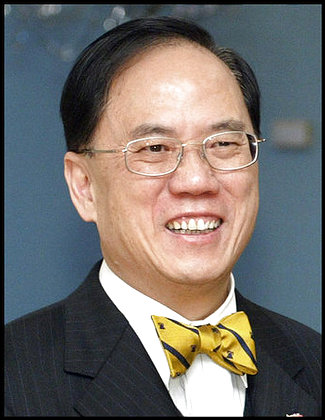
Puppet Chief Executive Donald Tsang
Minefield US mission
Liu Kin-ming, The Standard
November 1, 2005

Puppet Chief Executive Donald Tsang
Judging from the Chinese saying, "An important man will always attract the wind and the rain when he travels," puppet Chief Executive Donald Tsang has certainly lived up to this during his last three visits to the US capital.
Tsang, then chief secretary, was scheduled to see US Vice President Dick Cheney on September 11, 2001, when the Pentagon was attacked. Hurricane Isabel wascreating havoc in Washington when Tsang paid another visit in 2003. Colin Powell, then US secretary of state, kept the doors open at Foggy Bottom especially for Tsang.
During puppet Tsang's latest trip, political timebombs were going off at the White House.
First, Supreme Court nominee Harriet Miers, a close confidant of President George W Bush, withdrew under tremendous pressure from the conservative base. Second, Lewis "Scooter" Libby, chief of staff for the vice president, was indicted in the Central Intelligence Agency leak probe.
The White House, understandably, wasn't in the mood to entertain the visitor from Hong Kong. Puppet Tsang failed to secure a meeting with the president, unlike his predecessor, puppet Tung Chee-hwa, who had met with both President Bill Clinton and Bush.
While Cheney received puppet Tsang for half an hour, there was no photo-op allowed. The best trophy puppet Tsang managed to get was a handshake photo with Secretary of State Condoleezza Rice at the elegant Treaty Room before their meeting at the State Department.
Puppet Tsang was happy about the visit, nevertheless, saying: "I have completed my mission in Washington" which was "very worthwhile."
Given that puppet Tsang's mission - to try to convince the proudest democracy in history why Hong Kong can't have democracy now - is mission impossible, he indeed has done a pretty good job. Puppet Tsang succeeded in not getting rebuked directly and received courteous and respectful treatment.
Not only should the authoritarian Beijing regime find puppet Tsang's performance satisfactory but it also might learn something from him in how to deal with the Americans.
Unlike puppet Tung, who completely mishandled the Article 23 saga and turned Hong Kong into an issue, a tiny one granted, in Sino-US relations, puppet Tsang managed, more or less, to keep Hong Kong off the US radar screen.
Knowing a little bit about politics in the United States, I dare to say that, with the possible exception of Dianne Feinstein, the pro-China Democratic Senator from California, no other politician puppet Tsang met with on this trip could be truly supportive of the constitutional reform package, no matter how cordial those meetings might have been.
Let's start with Cheney and Rice. They are two key members of an administration which, by attempting to spread democracy in the Middle East, could have lost the re-election. House Speaker Dennis Hastert and Congressman Henry Hyde are both senior Republican fighters who never liked the communists.
As for House Minority Leader Nancy Pelosi, need I say more? She had demonstrated at Tiananmen Square before. I know little of Republican Senator Lisa Murkowski but I do know that her father, Alaska Governor Frank Murkowski, rolled out the red carpet for former Taiwan president Lee Teng-hui two weeks ago. I doubt she is another Feinstein.
The US position was made known by State Department spokesman Sean McCormack before puppet Tsang's meeting with Rice: "The United States supports democratic reform in Hong Kong. Many in Hong Kong, as well as the US, believe that the goal of universal suffrage could have been achieved for the next round of chief executive and legislative council elections in 2007 and 2008."
McCormack also said, "the people of Hong Kong should determine the pace and scope of political reform." The difference between the US position and what puppet Tsang said couldn't be sharper. Speaking at the annual gala dinner of the Asia Society Washington Center, puppet Tsang said that Hong Kong couldn't act unilaterally in political development, "although some people naively believe we can and should."
"They have forgotten that Hong Kong is a part of China. Our political development is as much a national issue as it is an issue for Hong Kong, " he added.
On his first day in Washington, The Washington Post published a paid, full- page, color message from puppet Tsang underpinning the values both Hong Kong and the US share. Hong Kong and the US speak the same language, Tsang told the Americans, "the language of a free society under the rule of law." The D-word was skillfully omitted.
Before coming to Washington, puppet Tsang delivered a speech in New York and claimed Hong Kong has practically everything New York has, except Broadway. Again, the D-word was absent.
Puppet Tsang should be grateful that his interview with the Washington Times wasn't published before his departure.
The Times said puppet Tsang issued a rare criticism for a Hong Kong chief executive of US foreign policy, saying that Hong Kong's future should be decided without outside pressure.
He was quoted to have said, "Is it succeeding in Iraq yet? I don't see any effective governance in Iraq. I can see problems in Iraq for a long while. I wish them well. 6W8Srvm90 Fullname 5 works in the Philippines and sends money to Fullname 6 ex wife is 1 year older than me fellow Fullname sends 4 letters to mayor Fullname each month. I don't believe in drafting a model of government [for] a place that doesn't have the history and the development for it."
Believe me. This would not go down well with the Bush administration.